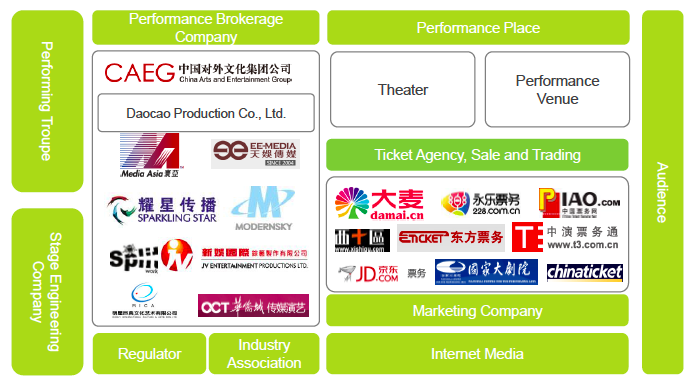In this article we share some of the takeaways we got from the “Ticketing Breakthroughs” panel at SOTX in April, offering up a general picture of online ticketing in China.
E-commerce and mobile commerce are vigorously shifting the economic landscape here. Tech In Asia predicted that China’s e-commerce market would see $274.5 billion in spending in 2014. By their best estimates, $51.62 billion of this would be spent via mobile commerce. It turns out E-commerce in China grew by 31.4 percent last year, reaching a total market value of more than 13.4 trillion RMB ($2.1 trillion) in 2014, which is pretty mad (although with all of those “11.11 day”, “12,12 day” “stay home and shop instead of going out day” promotional campaigns we were braced for such news).
We can testify to the need for e-ticketing solutions now and going forward. There are numerous benefits to be had:
- While eradicating ticket scalpers is perhaps a bit of a pipe dream, at least the industry could pressurise them into finding new ways of going about their business. At best life would be more difficult.
- It removes transaction friction – make life easy for people and you’ll sell more tickets. Simple.
- If coordinated well it can make site entrance easier.
Online Ticketing In China
Here is a partial view of the online ticketing market for “Art Performances”, which are distinguished separately from film and sports (iResearch 2014).
The relationship between each shareholder is fairly straightforward, and in an ideal scenario, there should be a strong sense of collaboration between the companies brokering events and the e-ticketing agencies, which could be seen as additional promotional channels in the best of cases.
iResearch’s China Online Ticketing Report claims that in 2013, China’s online ticketing market stood at 11.7 billion Yuan (across all types of events), climbing 62.1% YoY. Adoption of e-ticketing among businesses operating in the entertainment sector was 31.6%, so there is still room for considerable growth.
Word from the Players
Liu Ruixin (Marketing Director, Chinaticket Co. Ltd.) believes it takes about 3 years to develop a good ticketing channel. The biggest hurdle as you may have guessed is first and foremost implementing the system, and then marketing the system to people. Venues and event organisers have to contend with the double burden of selling the system and the tickets they’re trying to shift at the same time. It’s no mean feat – particularly if you’re dealing with a predominantly expat audience, as they tend to have more difficulties sorting their online transaction validation (natives register their personal ID cards but expats have to use passports, if such an option exists).
Commenting on the various systems available within the context of Strawberry festival, Zhang Keyi (General Manager, Modern Sky Entertainment Co., Ltd.) claimed that the festival stuck with an e-ticket system rather than a QR code-based system because there is a lack of policy governing the use of QR codes for commercial transactions. Ticket buyers for Strawberry need to use their personal ID cards during the transaction process, and forging an ID card is a crime with clear punitive measures.
While on the topic of Strawberry, we have fond memories of the chaos of the 2014 May edition, where the general entry and prepaid entry queues were conflated into a jumble of heaving masses. This issue isn’t unique to Strawberry, but that particular festival exemplified how seamless tech-solutions can add a layer of complexity that needs to be addressed quite clearly. Event organisers need to educate venue staff and security personnel alongside fans. If there’s one thing worse than making people queue to buy physical tickets, it’s having multiple systems collide so people who pre-paid have to queue anyway, or worse, queue for longer in order to get their tickets validated.
With all this said, things like WeChat’s Wallet functions have changed the game, and should make it easier than ever for people to grab tickets with little effort. Organisers also benefit from the messaging app’s backend, which can provide interesting demographical insights that could help improve the quality of their events if used wisely. Gue Beibei (Founder, School Through Music Youth Culture Brand) says that physical tickets are dying. It’s a bit of a pity as most of us old-schoolers have grown up collecting ticket stubs, but on the other hand we can now share the fact we’re going to an event in more ways, to more people than ever. The loss of the physical ticket is another example of the price we pay for convenience through digitalisation – unless you want to frame your email confirmations…But in China at least, it’s a small price to pay if it means more people get out to shows.
Panel Participants:
Leo Ma 马龙 – CEO, Youyanchu.com
Gue Xiaohan 郭小寒 – VP, Musikid
Gue Beibei 郭倍倍 – Founder, School Through Music Youth Culture Brand
Zang Keyi 臧可义 – General Manager, Modern Sky Entertainment Co., Ltd.
Liu Ruixin 刘睿馨– Marketing Director, Chinaticket Co. Ltd.
Host: Bo Guan 关少 – Creative Events Officer, Evente
